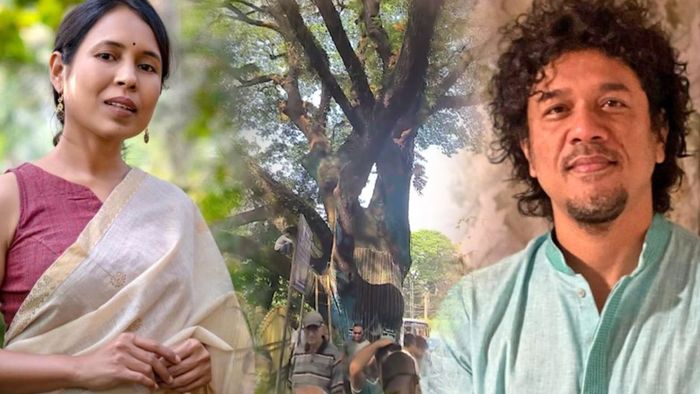Papon Angaraag to Rima Das: Celebs express anger over slashing trees in Guwahati's Dighalipukhuri
The removal of the historic trees around Dighalipukhuri in Guwahati has stirred up strong sentiments among Assamese cultural icons like singer Papon Angaraag and filmmaker Rima Das.

- Oct 30, 2024,
- Updated Oct 30, 2024, 10:30 AM IST
The removal of the historic trees around Dighalipukhuri in Guwahati has stirred up strong sentiments among Assamese cultural icons like singer Papon Angaraag and filmmaker Rima Das.
Their responses highlight concerns over balancing development with preservation, emphasizing that these trees aren’t just greenery but integral parts of Assam’s heritage and identity.
Papon, on his social media, expressed frustration over the persistent destruction of century-old trees for projects deemed necessary for the city's modernization, remarking that such development risks erasing Guwahati’s historical charm and ecological identity. He urged for a more thoughtful approach where development could coexist with preserving historical elements, even if it requires additional resources.
Rima Das also voiced her distress over the loss, mourning the irreplaceable value of these trees, which she considers a part of Assamese heritage. She appealed for a deeper understanding of the emotional and cultural loss caused by these decisions. Their comments resonate with a broader debate on sustainable urban planning, where progress should ideally be harmonized with environmental and cultural preservation.
Also Read: Guwahati citizens protest against felling of trees for flyover, demand preservation of Dighalipukhuri's heritage
Construction of a nearly six-mile-long flyover from Reserve Bank to Noonmati is already underway. However, the project has sparked widespread discontent among local residents and the people of Guwahati after a recent change in the flyover's design, which now includes the Tayabullah Road, potentially threatening the heritage and beauty of Dighalipukhuri.
Authorities on October 28 marked around 25 trees along the Tayabullah Road and in front of Handique Girls’ College with yellow crosses for felling, including some trees that are reportedly over 200 years old.
In response to a Right to Information (RTI) query, the Public Works Department’s (PWD) executive engineer acknowledged that no environmental impact study had been conducted regarding the potential effects of the flyover on the surrounding area of Dighalipukhuri, nor was any public hearing held. The marking of trees, which are home to many birds and contribute significantly to the city’s ecology, has raised alarms among nature enthusiasts in Guwahati.
A group of 38 prominent citizens have voiced their opposition to the tree-cutting proposal and called for a protest on October 29, 2024. In a statement, the group expressed concern, stating, "The construction of the flyover from Noonmati to Dighalipukhuri commenced without conducting an environmental impact study or considering the opinions of the local residents. Now, they plan to cut down trees that are 200 years old to make way for the flyover. This will adversely affect the biodiversity and heritage of Dighalipukhuri and will have a broader impact on the environment of the entire city. These trees not only provide a habitat for many bird species but also offer relief from the sweltering heat, acting as the lungs of the metropolis."